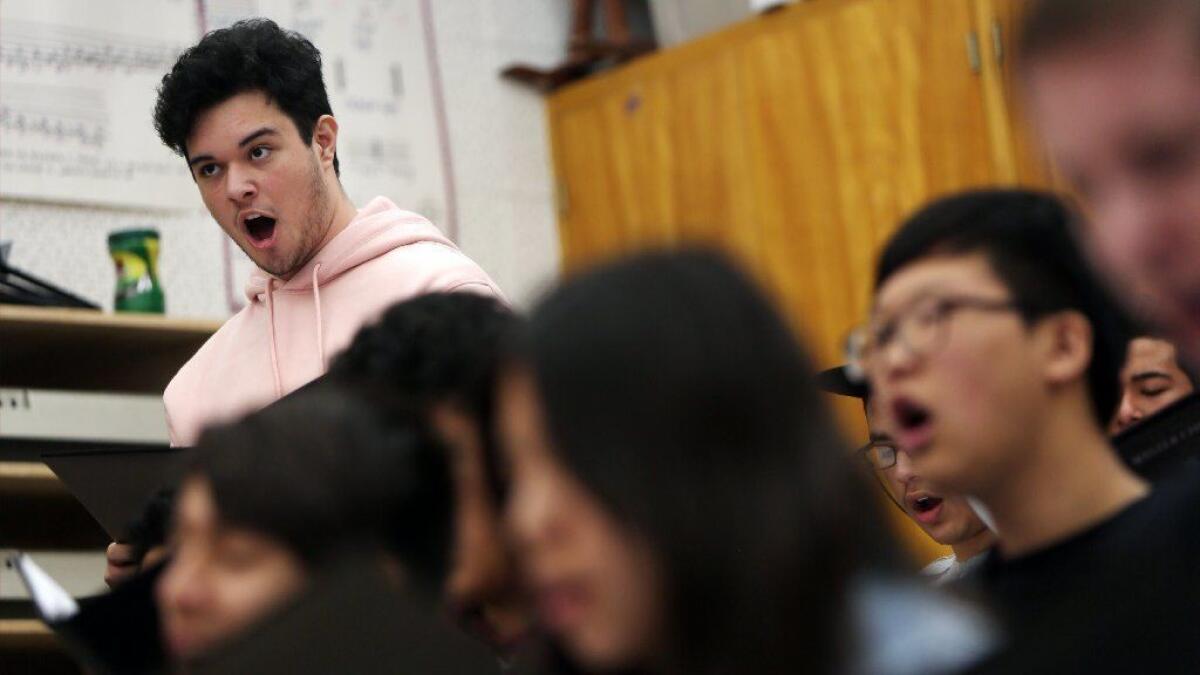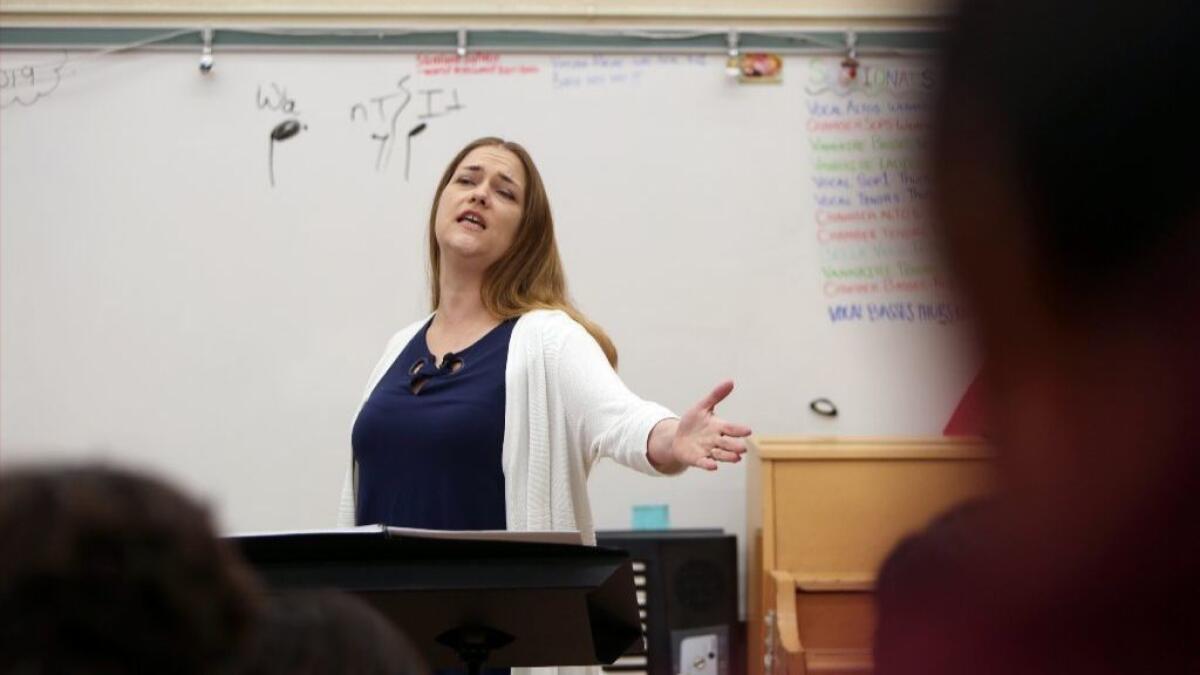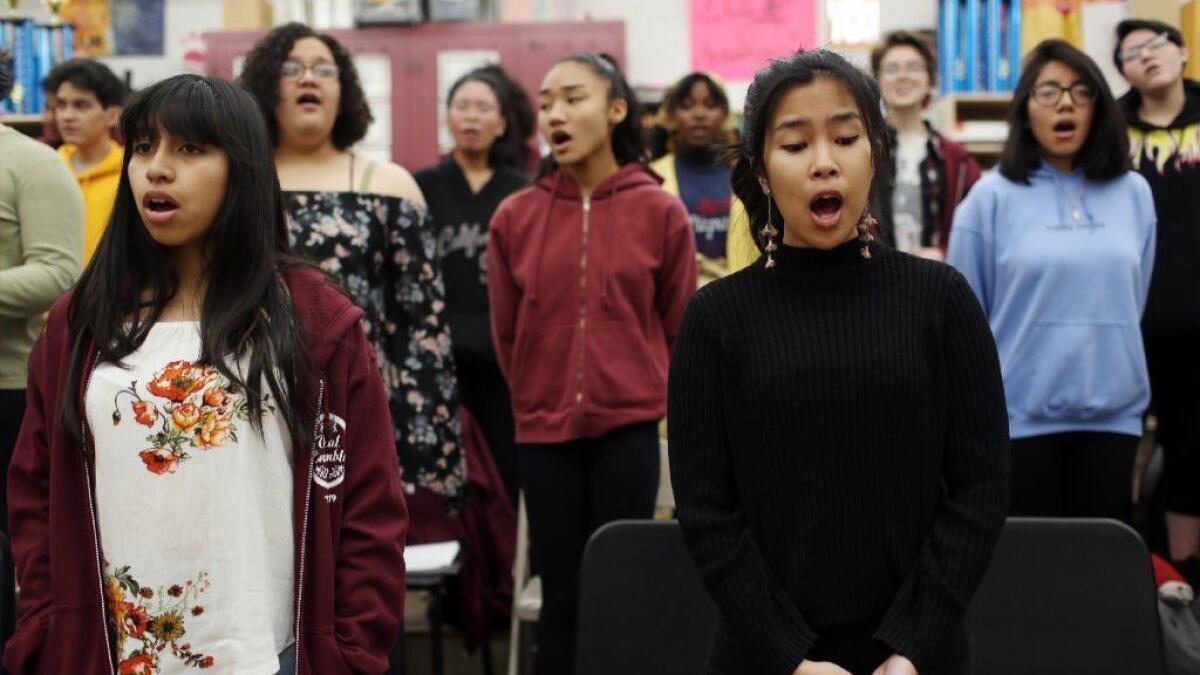A Van Nuys student ‘Walkout’: East L.A. and Parkland activists inspire school choir

- Share via
With a wave of choral director Brianne Arevalo’s hands and her body’s motioning, the students inside Room 425 at Van Nuys High School take a breath before song pours from their mouths.
“Walkout, walkout, walkout,” the teenagers belt out in unison like a palpitating heartbeat. Composer Saunder Choi pummels ominous chords from an old, scratched-up grand piano.
For the record:
3:50 p.m. Feb. 28, 2019An earlier version of this post misspelled the first name of Lesili Beard, L.A. Master Chorale’s education director and executive producer of the Oratorio Project, as Leisili.
“What do we want? Equality,” half the students sing, stretching the last word a few notes. Others repeat the foreboding “walkout.”
“When do we want it? Now!” they demand.
After several stanzas, the piano slows to feathery single notes and soprano Jessica Turcios, 17, rises from her seat in the back of the room.
“I see the way my teachers look me. As though I am small and insignificant because of my race,” she sings solemnly. “I feel I am less of a person, not fit for education, not fit for anything other than physical labor.”
The setting is Garfield High School in 1968, and Turcios, a senior, sings the part of Paula Crisostomo, a leader of the East Los Angeles student walkouts that helped to spark the Chicano power movement. The Brown Berets and Sal Castro, a teacher and activist who played a leading role in the rebellion, are also featured characters in the piece.

Turcios, her choir mates and Arevalo are rehearsing “Walkout: Past, Present, Repeat,” an oratorio written and composed by Van Nuys High School’s choir students and produced by the Los Angeles Master Chorale’s Voices Within Oratorio Project. This year’s oratorio recounts the events of May 5, 1968, and the generations of student activists who followed.
On that day more than 50 years ago, hundreds from East Los Angeles high schools walked out of their classrooms to protest dilapidated campuses, a lack of college-preparatory classes and teachers accused of being unqualified, indifferent to students’ needs or outright racist toward the predominantly Latino students.
At the height of the protests a week later, about 22,000 from high schools including Garfield, Lincoln and Roosevelt had marched out of classrooms and changed history.

East L.A. 1968: The day high school students helped spark the Chicano power movement »
On Friday, 85 choir students and 11 student instrumentalists will premiere for classmates the 10-movement oratorio alongside professional singers and musicians. On Saturday, the performance will open to the public. The concert will be accompanied by projections of historical images from the walkout, provided by the UCLA Chicano Studies Research Center.
The production will be the culmination of six months of training, rehearsals and research. For 19-year-old Rafael Alejandro Gómez Garcia, participating in this project was his introduction to the historic walkouts.
“Honestly, I didn’t know anything about the walkouts,” the senior tenor said. “But I thought it was really interesting to learn about people from where I come from unify to lift themselves from social injustices. That was really inspiring to me.”
About four years ago, Gómez moved to the U.S. from Jalisco, Mexico. He knew no English but credits music and the choir for helping him learn the language quickly. “I come from that culture, so it’s easier to feel empathy for those students,” he said.
In rehearsing “We Rise, We Walk,” professional singer Alice Kirwan Murray urges students to put themselves in the story. “You’re all immigrants in this scene,” she reminds them. The woeful song narrates the experiences of three “immigrants” walking across the desert.
“We were lost. Still not knowing what to do. We walk for the dream of America. … We do our best. We try to survive. Our futures are not set in stone,” the choir sings, dragging the last word.

The lyrics are personal to Gómez. Although he was fortunate enough to come into the country legally, he knows many are not. “Some of my family members really struggled with that,” he said, noting how nervous he is about the upcoming performance. “I want to do it well … and I really want to personify those people, to give them voice.”
Giving voice to these stories is also important to Genevieve Rochblatt.
“I think especially in current times … problems with racial equality aren’t gone and they’re not fixed yet. If people stop talking about them, then nothing’s ever going to change, and as long as we continue the conversation and keep bringing awareness to people, that’s how things get done,” the 17-year-old soprano said, who performed in last year’s project about the history of women’s rights.
When students and teaching assistants were brainstorming subjects for this year’s oratorio, they knew the story had to be epic.
“Ironically, we settled on this,” said Lesili Beard, L.A. Master Chorale’s education director and executive producer of the Oratorio Project. “Who knew that Stoneman Douglas and all of these school shootings and things that incited activism today would be so relevant?” she added.
Movement eight of the oratorio, titled “When Will We Learn?,” pays homage to the student victims and activists of last year’s Parkland, Fla., shooting that killed 17 people.
The setting is Washington, D.C., 2018, during the March for Our Lives rally, which mobilized thousands of people across the U.S. and around the world in support of gun control.
It was the movement that Rochblatt and several other choir members were assigned to write lyrics for.
“It was a lot,” she said about scripting the piece. “It was very emotional because school shootings are something that happen all over, and shootings happen nearby. ... I think it’s scary to think about how close that can be, and it’s important that things need to change. And I think being the group that wrote about that … we really had to understand it in writing.”
The song goes: “We are not a statistic. It happened to us. A normal school day. I saw it all happen. I hid in the auditorium. Silent witness …”
Writing that last lyric, she said, was “a really big feeling to try to understand.”
But these stories, she said, are ones she wants to honor.
More to Read
The biggest entertainment stories
Get our big stories about Hollywood, film, television, music, arts, culture and more right in your inbox as soon as they publish.
You may occasionally receive promotional content from the Los Angeles Times.











